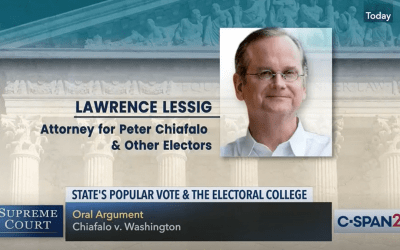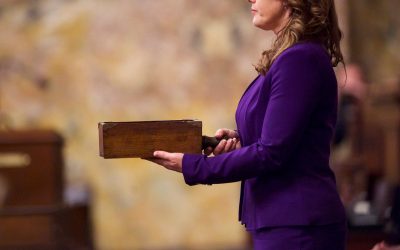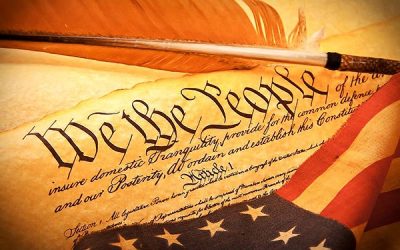ELECTORS FREEDOM
OUR LEGAL FIGHT TO ALLOW ELECTORS TO VOTE THEIR CONSCIENCE
IMPORTANT UPDATE:
We got a decision from the U.S. Supreme Court in our case about the freedom of presidential electors. But our fight for reform continues! We’re launching the Fix The College project to continue the discussions about the best way forward.
THE LEGAL ARGUMENT
THE LEGAL ARGUMENT
We’re helping electors in Colorado and Washington who were threatened or fined by their state government for voting their conscience in 2016 — so as to assure that the Supreme Court resolves this question before the next election.
We believe the Supreme Court will affirm elector freedom. That will give states the opportunity to respond before the next election. The most likely — and effective — response would be for states to join the National Popular Vote Interstate Compact. 270 electors were pledged to the winner of the national popular vote automatically, then the additional electors from non-Compact states would be certain to create a margin significant enough to neutralize any effect of elector independence.
OUR LAWSUITS
Nemanich v. Colorado Department of State (2017)
We have filed a lawsuit on behalf of three electors in Colorado who sought to defend their constitutional freedom to vote their conscience in the last presidential election as federal electors. Michael Baca, Polly Baca, and Robert Nemanich believed the special circumstances of the last election required that they vote their conscience, contrary to a pre-election pledge. Secretary of State Wayne Williams threatened them with removal, if they indeed did vote against their pledge, as well as criminal prosecution.
Guerra v. Washington State Office of Administrative Hearings (2017)
Washington State fined three electors, Peter Bret Chiafalo, Levi Jennet Guerra, and Esther Virginia John, who voted their conscience, contrary to a pre-election pledge. This case raises the question whether the state of Washington has the constitutional power to compel its electors to vote for a particular presidential and vice-presidential candidate, i.e. whether states may penalize an elector who votes contrary to her pledge, by imposing a civil fine or other penalty. We are supporting the legal defense of these electors to resolve the constitutional question.
LEARN MORE ABOUT THE CASES
- Second Amended Complaint – October 25, 2017
- Defendant’s Motion to Dismiss – November 8, 2017
- Plaintiff’s Response to Defendant’s Motion to Dismiss – December 22, 2017
- Reply in Support of Defendant’s Motion to Dismiss – January 19, 2018
- Order on Motion To Dismiss – April 10, 2018
- Opening Brief of Appellants – June 25, 2018
- Opening Brief of Appellants Appendix – June 25, 2018
- Brief for Amicus Independence Institute in Support of Plaintiffs-Appellants – June 27, 2018
- Brief of Amici Curiae Michael L. Rosin and David G. Post – June 27, 2018
- Amicus Curiae Brief of Derek T. Muller In Support of Neither Party – July 2, 2018
- Appellee’s Response Brief – August 22, 2018
- Appellee’s Supplemental Appendix – August 22, 2018
- Brief of Amicus Curiae Colorado Republican Committee – August 29, 2018
- Amicus Curiae Brief of Robert M. Hardaway – August 29, 2018
- Reply Brief of Appellants – September 17, 2018
- United States Court of Appeals Decision – August 20, 2019
Washington – Levi Guerra, Esther v. John, and Peter B. Chiafalo v. Washington State Office of Administrative Hearings
- Petitioners’ Opening Brief – October 24, 2017
- Secretary of State’s Responding Brief – November 13, 2017
- Petitioners’ Reply Brief – December 12, 2017
- Appellants’ Statement of Grounds for Direct Review By The Supreme Court – December 29, 2017
- Answer to Statement of Grounds – January 26, 2018
- Brief of Appellants – May 10, 2018
- Brief of Respondent – July 11, 2018
- Reply Brief of Appellants – August 10, 2018
- Brief for Amicus Curiae Independence Institute – December 5, 2018
- Brief of Amicus Curiae Michael L. Rosin – December 7, 2018
- Secretary of State’s Combined Response to Amici Independence Institute and Michael L. Rosin – January 8, 2019
- Washington Supreme Court Decision – May 23, 2019
- Petition for a Writ of Certiorari– October 7, 2019
Harvard Law Today: Lessig, who argued on behalf of ‘faithless electors,’ responds to the Supreme Court’s decision
In a unanimous decision on Monday, the Supreme Court ruled that states can require Electoral College voters to back the victor of their state’s popular vote. The decision gives states the right to compel so-called ”faithless electors” to cast their electoral ballots...
Harvard Law Today: Does recent Supreme Court ruling suggest the Electoral College is ‘good for nothing’ ?
During the 2016 presidential election, multiple presidential electors tried to cast ballots for people who didn’t win a majority of their states’ votes. After Colorado removed one elector and Washington fined three, the electors sued, arguing that the U.S....


